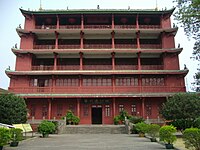Guangzhou's Zhenhai Tower
| Zhenhai Tower | |||||||
 |
|||||||
| Traditional Chinese | |||||||
|---|---|---|---|---|---|---|---|
| Simplified Chinese | |||||||
| Literal meaning | Sea-Guardian Building | ||||||
|
|||||||
| Five-Story Pagoda | |||||||
| Traditional Chinese | |||||||
| Simplified Chinese | |||||||
| Literal meaning | Five-Story Building | ||||||
|
|||||||
| Transcriptions | |
|---|---|
| Standard Mandarin | |
| Hanyu Pinyin | Zhènhǎi Lóu |
| Transcriptions | |
|---|---|
| Standard Mandarin | |
| Hanyu Pinyin | Wǔcéng Lóu |
The Zhenhai Tower, also known as the Five-Storied Pagoda, is a tower in Guangzhou, Guangdong, China. It is located in Yuexiu Park, in central Guangzhou. It now houses the Guangzhou Museum.
It was first built in 1380, at the beginning of the Ming dynasty, by the Yongjia Marquis Zhu Liangzu (朱亮祖). The tower is 92 feet (25 meters) in height, 102 feet (31 meters) in width and 52 feet (16 meters) in depth.
By the time it was the highest building of Guangzhou when it was constructed. For a long period of time, it was the symbol of Guangzhou before the Wuyang Statue was built.
There is a folk rhyme around the residents about the pagoda, "肥仔个头,大过五层楼,肥仔隻手,细过荷兰豆" which literally means "Fat boy's head is even bigger than the five stories pagoda, fat boy's hands are even smaller than the snow peas." (Cantonese refers snow peas as Dutch bean as its first imported from Europe to Guangzhou.) The "fat boy" could be replaced by any person.
Coordinates: 23°8′26.37″N 113°15′37.67″E / 23.1406583°N 113.2604639°E
...
Wikipedia
